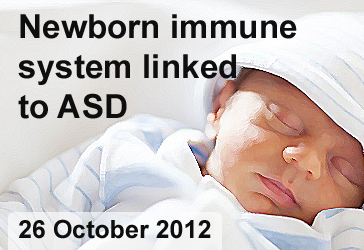Check out other stories from the Latest News
Researchers Examine Newborn Immune System in ASD Risk
By Stacy W. Kish on October 26, 2012

Background: Humans receive protection from their mothers (passive immunity) to resist infectious organisms before and shortly after birth. This protection, however, only protects the infant for several weeks. The baby’s immune system quickly activates after birth to begin defending the body from pathogens and resist infections. Previous work revealed that children and adults diagnosed with Autism Spectrum Disorder (ASD) had abnormal levels of immune molecules in their blood.
What’s new: A recent study published in the Journal of Neuroimmunology examined the blood samples of more than 300 newborns later diagnosed with autism and more than 700 control patients. The researchers measured the level of 16 cell signaling molecules, called cytokines, that contribute to the immune system. Their work showed that nine of the molecules were lower (in particular T helper 1 and T helper 2) in the autistic patients as newborns and adults compared to the controls. The samples were collected between 1982 and 2000 in Denmark.
Why it’s important: Previous work has shown that autistic patients have increased levels of certain circulating immune molecules known as cytokines. This study, however, is the first to show a decreased level of select cytokines. The discrepancy may be due to study complications, such as diagnostic inconsistencies or sample degradation. A mechanism that depresses immune function specifically in the newborn remains unclear.
Help me understand :
| Source(s) : |
| Tweet |

